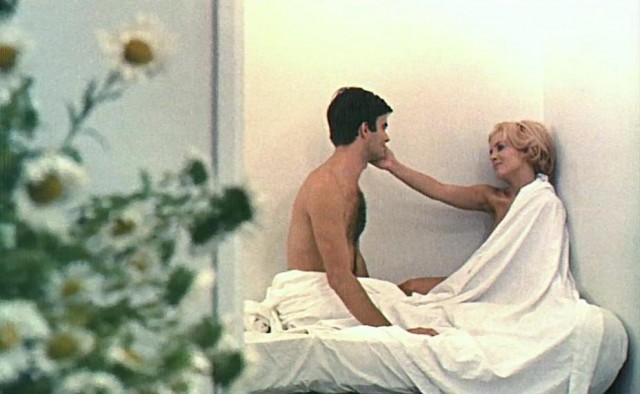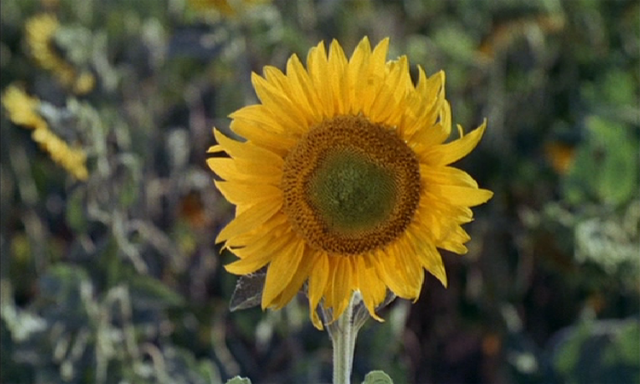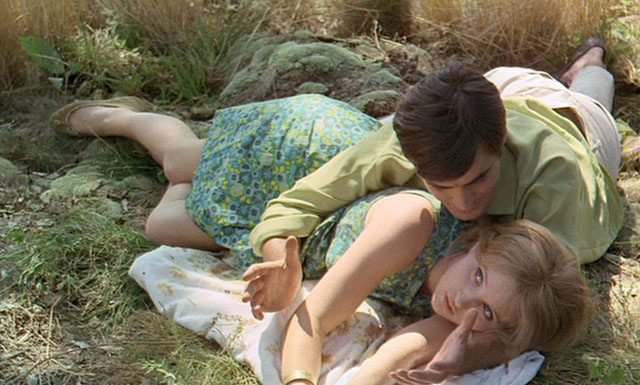
François (Jean-Claude Drouot) tries to convince Thérèse (Claire Drouot, his real-life wife), that he has plenty of happiness to spread around in Le Bonheur
LE BONHEUR (HAPPINESS) (Agnès Varda, 1965)
Metrograph
7 Ludlow St. between Canal & Hester Sts.
Wednesday, June 19, 8:15
Thursday, June 20, 5:30
Series continues through July 4
metrograph.com/film
Metrograph is celebrating the fiftieth anniversary of the family-run independent film company mk2, founded in 1974 by Marin Karmitz, with “Visionary Auteurs: Five Decades of mk2,” consisting of screenings of nearly two dozen works, from such directors as Louis Malle, Claude Chabrol, Marcel Carné, the Dardenne brothers, Jean-Luc Godard, Wim Wenders, Hong Sang-soo, and Menahem Golan. On June 16, 19, and 20, Metrograph will show a classic from French Nouvelle Vague filmmaker Agnès Varda.
In 1965, Varda said about her third film, Le Bonheur, which translates as Happiness: “Happiness is mistaken sadness, and the film will be subversive in its great sweetness. It will be a beautiful summer fruit with a worm inside. Happiness adds up; torment does too.” That is all true nearly fifty years later, as the film still invites divided reaction from critics. “Miss Varda’s dissection of amour, as French as any of Collette’s works, is strikingly adult and unembarrassed in its depiction of the variety of love, but it is as illogical as a child’s dream,” A. H. Weiler wrote in the New York Times in May 1966. “Her ‘Happiness,’ a seeming idyll sheathed in irony, is obvious and tender, irresponsible and shocking and continuously provocative.” All these decades later, the brief eighty-minute film is all that and more, save for the claim that it is illogical. In a patriarchal society, it actually makes perfect, though infuriating, sense.
French television star Jean-Claude Drouot (Thierry La Fronde) stars as the handsome François, who is leading an idyllic life with his beautiful wife, Thérèse (Claire Drouot), and their delightful kids, Pierrot (Olivier Drouot) and Gisou (Sandrine Drouot), in the small, tight-knit Parisian suburb of Fontenay. While away on a job, François meets the beautiful Émilie (Marie-France Boyer), a postal clerk who connects him to his wife via long-distance telephone, flirting with him although she knows he is happily married. And despite being happily married, François returns the flirtation, offering to help with her shelves when she moves into an apartment in Fontenay. Both François and Émilie believe that there is more than enough happiness to go around for everyone, without any complications. “Be happy too, don’t worry,” Émilie tells him. “I’m free, happy, and you’re not the first,” to which he soon adds, “Such happiness!” And it turns out that even tragedy won’t put a stop to the happiness, in a plot point that angered, disappointed, confused, and upset many critics as well as the audience but is key to Varda’s modern-day fairy tale.
Le Bonheur is Varda’s first film in color, and she seems to have been heavily influenced by her husband, Jacques Demy (The Umbrellas of Cherbourg, The Young Girls of Rochefort), bathing the film in stunning hues that mimic Impressionist paintings, particularly the work of Pierre-Auguste Renoir, in a series of picnics and flower-filled vases. In a sly nod, at one point a black-and-white television is playing the 1959 film Le Déjeuner Sur L’herbe (“Picnic on the Grass”), which was directed by Jean Renoir, one of Auguste’s sons, and also deals with sex, passion, procreation, and nature. Le Bonheur also features numerous scenes that dissolve out in singular blocks of color that take over the entire screen. Cinematographers Claude Beausoleil and Jean Rabier shoot the film as if it takes place in a candy-colored Garden of Eden, all set to the music of Mozart, performed by Jean-Michel Defaye. Varda doesn’t allow any detail to get away from her; even the protagonists’ jobs are critical to the story: François is a carpenter who helps builds new lives for people; Thérèse is a seamstress who is in the midst of making a wedding gown; and Émilie works in the post office, an intermediary for keeping people together. As a final touch, François, who represents aspects of France as a nation under Charles de Gaulle, and his family are played by the actual Drouot clan: Jean-Claude and Claire are married in real life (and still are husband and wife after more than fifty years), and Olivier and Sandrine are their actual children, so Le Bonheur ends up being a family affair in more ways than one.
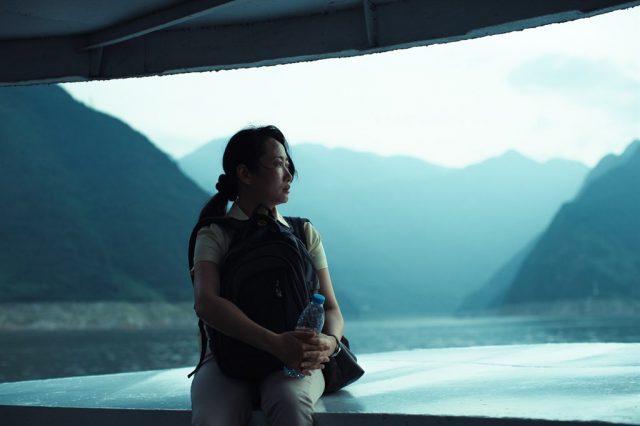
Qiao (Zhao Tao) how her life is turning out in Jia Zhang-Ke’s Ash Is Purest White
ASH IS PUREST WHITE (Jia Zhang-Ke, 2018)
Friday, June 28, 10:30
Saturday, June 29, 9:15
Thursday, July 4, 9:15
metrograph.com/film
www.ashispurestwhitemovie.com
Jia Zhang-Ke reaches into his recent past, and China’s, in his elegiac Ash Is Purest White. In the film, which screens at Metrograph June 28 and 29 and July 4, the Sixth Generation writer-director’s wife and muse, Zhao Tao, stars as Qiao, a combination of the characters she played in Jia’s 2002 Unknown Pleasures and 2006 Still Life. It’s the spring of 2001, and Qiao is living in style with her handsome, ultracool jianghu boyfriend, well-respected local gangster Guo Bin (Liao Fan). She runs a gambling parlor, where she asserts her power with men who are in awe of her. But when a rival gang attacks Bin and Qiao pulls a gun, their lives take a series of unexpected turns as the story moves first to 2006 and then to 2018, when things are decidedly, and sadly, different for both of them in a China that has changed as well.
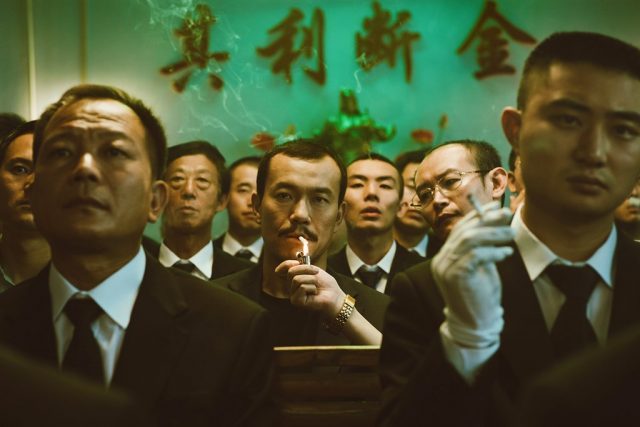
Things are about to change for Guo Bin (Liao Fan) in Ash Is Purest White
As in many of his fiction works, Jia includes documentary elements as he touches upon China’s socioeconomic crisis, primarily exemplified by the Three Gorges Dam project, which led to the displacement of families and the literal disappearance of small communities. Working with a new cinematographer, Eric Gautier, who has lensed films for Olivier Assayas, Walter Salles, Leos Carax, Alain Resnais, and Arnaud Desplechin, among others — his longtime cameraman, Yu Lik-Wai, was unavailable — Jia incorporates general footage he shot between 2001 and 2006 of everyday people and architecture that underscores China’s many changes. There are many gorgeous shots of towns and cities, at one point bathed in white volcanic ash, with costumes of bright yellow, red, and blue, as Gautier goes from digital video to Digibeta, HD video, film, and the RED Weapon camera to add distinct textures. (Jia took the title from what was supposed to be Fei Mu’s last work, which was later made by Zhu Shilin.)
Qiao and Bin try to go back, but little is the same, except for some of their old friends, who are still trying to hold on to the way things were. Zhao (A Touch of Sin, Mountains May Depart) is slow and deliberate as Qiao, her wide eyes telling a story all their own as she wrestles with disappointment, searching for some meaning in her life, while Fan (The Final Master; Black Coal, Thin Ice) is bold and forceful as a proud, powerful man who undergoes a radical shift. “The city is developing fast. It’s ours for the taking,” Bin says early on. But in Jia’s moving, heartfelt epic, there’s nothing for them to grab on to anymore.
[Mark Rifkin is a Brooklyn-born, Manhattan-based writer and editor; you can follow him on Substack here.]
